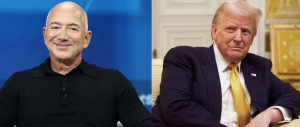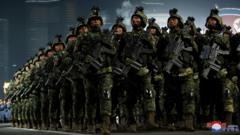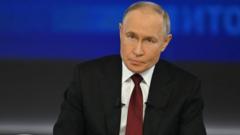As the nearly three-year war between Russia and Ukraine continues, former President Donald Trump has prominently featured the conflict in his recent comments, calling on Russian President Vladimir Putin to facilitate a ceasefire. With the prospect of resuming office as president-elect in the upcoming elections, Trump’s statements on social media and during interviews have drawn significant global attention.
Trump Pushes for Ceasefire in Russia-Ukraine Conflict Ahead of Election

Trump Pushes for Ceasefire in Russia-Ukraine Conflict Ahead of Election
Former President Donald Trump advocates for a ceasefire, stirring both support and concern among U.S. allies and critics as he eyes a return to the presidency.
In a recent post, Trump asserted that Ukrainian President Volodymyr Zelenskyy desires to negotiate peace, stating, “Zelenskyy and Ukraine would like to make a deal and stop the madness.” This remark has intensified speculation regarding his potential diplomatic strategy, even as critics express concerns about his views on military aid and NATO obligations.
In a televised interview on NBC’s Meet the Press, Trump confirmed his commitment to ending the war, although he refrained from disclosing any direct communications with Putin since the November elections. “I don’t want to say anything about that, because I don’t want to do anything that could impede the negotiation,” he remarked, leaving the nature of his diplomatic efforts open to interpretation.
One of the more controversial aspects of Trump’s recent rhetoric involves his suggestions to reevaluate U.S. support for NATO and military assistance to Ukraine. His contemplation of reducing American aid has alarmed Ukrainian officials, NATO allies, and national security experts within the U.S. Critics fear this may diminish Western unity and empower Russia, while supporters contend that such a stance could lead to a more pragmatic resolution of the conflict.
The discourse surrounding Trump’s proposals has ignited a vigorous debate about potential implications. Advocates for his approach argue that his negotiation style and reconsideration of U.S. foreign obligations might pave a path toward peace. In contrast, opponents voice concerns that decreasing military aid or withdrawing from NATO could leave allies exposed and destabilize global security frameworks.
As the war enters its third year, Trump’s push for a ceasefire highlights the intricate nature of international diplomacy. While some interpret his advocacy for negotiations as a positive development, others approach his suggestions with skepticism, cautioning that they could undermine established alliances and strategies essential for maintaining global stability.
With global leaders, analysts, and citizens keenly observing the unfolding situation, Trump’s potential influence on U.S. foreign policy regarding the Russia-Ukraine conflict remains critical. The efficacy of his approach in either fostering peace or exacerbating existing challenges will be under careful examination in the months ahead.
In a televised interview on NBC’s Meet the Press, Trump confirmed his commitment to ending the war, although he refrained from disclosing any direct communications with Putin since the November elections. “I don’t want to say anything about that, because I don’t want to do anything that could impede the negotiation,” he remarked, leaving the nature of his diplomatic efforts open to interpretation.
One of the more controversial aspects of Trump’s recent rhetoric involves his suggestions to reevaluate U.S. support for NATO and military assistance to Ukraine. His contemplation of reducing American aid has alarmed Ukrainian officials, NATO allies, and national security experts within the U.S. Critics fear this may diminish Western unity and empower Russia, while supporters contend that such a stance could lead to a more pragmatic resolution of the conflict.
The discourse surrounding Trump’s proposals has ignited a vigorous debate about potential implications. Advocates for his approach argue that his negotiation style and reconsideration of U.S. foreign obligations might pave a path toward peace. In contrast, opponents voice concerns that decreasing military aid or withdrawing from NATO could leave allies exposed and destabilize global security frameworks.
As the war enters its third year, Trump’s push for a ceasefire highlights the intricate nature of international diplomacy. While some interpret his advocacy for negotiations as a positive development, others approach his suggestions with skepticism, cautioning that they could undermine established alliances and strategies essential for maintaining global stability.
With global leaders, analysts, and citizens keenly observing the unfolding situation, Trump’s potential influence on U.S. foreign policy regarding the Russia-Ukraine conflict remains critical. The efficacy of his approach in either fostering peace or exacerbating existing challenges will be under careful examination in the months ahead.






















